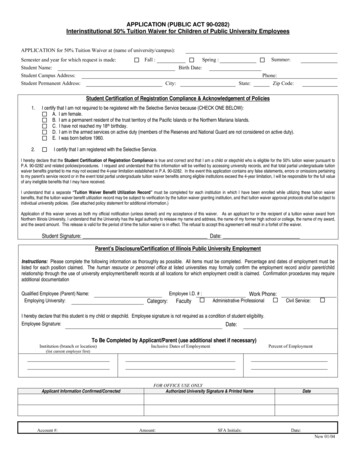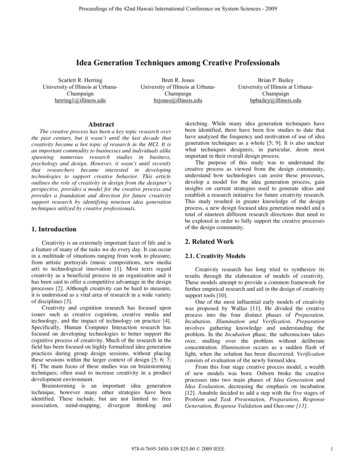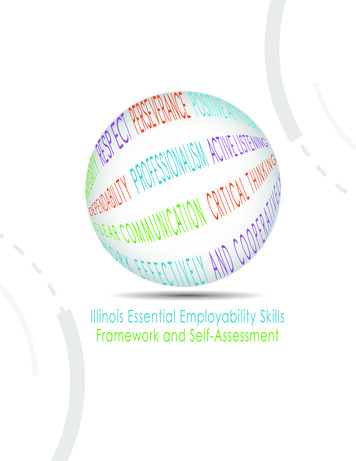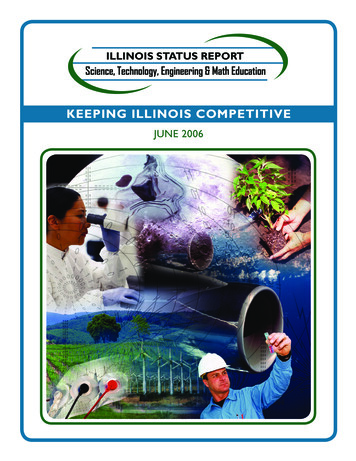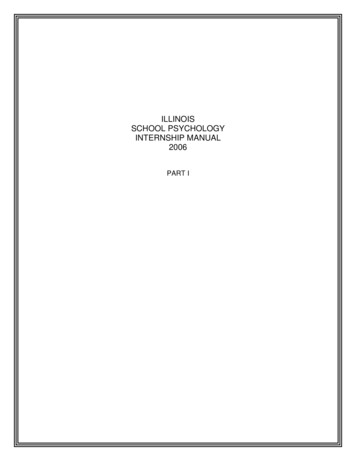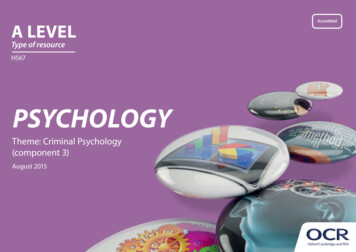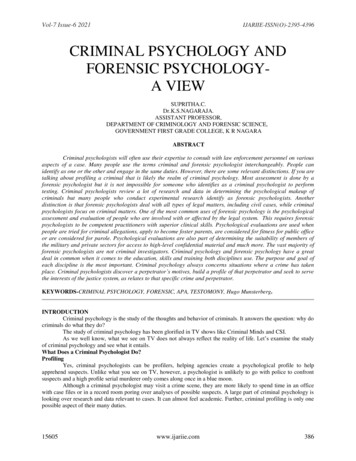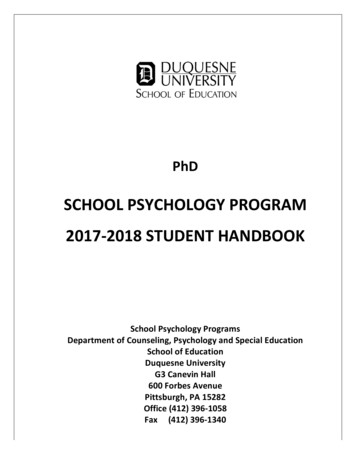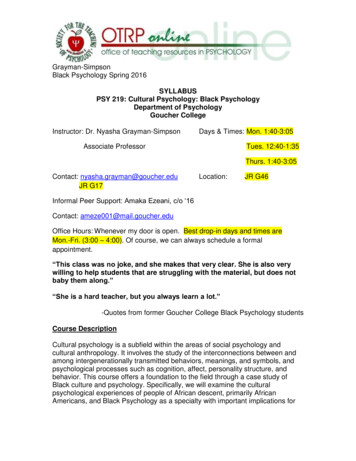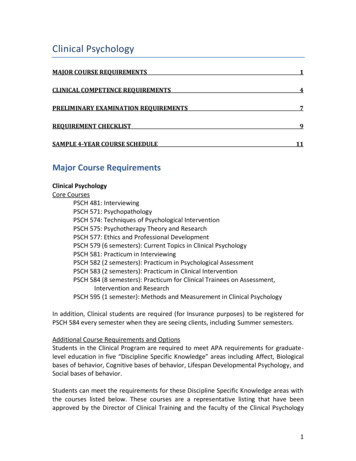
Transcription
Clinical PsychologyMAJOR COURSE REQUIREMENTS1CLINICAL COMPETENCE REQUIREMENTS4PRELIMINARY EXAMINATION REQUIREMENTS7REQUIREMENT CHECKLIST9SAMPLE 4-YEAR COURSE SCHEDULE11Major Course RequirementsClinical PsychologyCore CoursesPSCH 481: InterviewingPSCH 571: PsychopathologyPSCH 574: Techniques of Psychological InterventionPSCH 575: Psychotherapy Theory and ResearchPSCH 577: Ethics and Professional DevelopmentPSCH 579 (6 semesters): Current Topics in Clinical PsychologyPSCH 581: Practicum in InterviewingPSCH 582 (2 semesters): Practicum in Psychological AssessmentPSCH 583 (2 semesters): Practicum in Clinical InterventionPSCH 584 (8 semesters): Practicum for Clinical Trainees on Assessment,Intervention and ResearchPSCH 595 (1 semester): Methods and Measurement in Clinical PsychologyIn addition, Clinical students are required (for Insurance purposes) to be registered forPSCH 584 every semester when they are seeing clients, including Summer semesters.Additional Course Requirements and OptionsStudents in the Clinical Program are required to meet APA requirements for graduatelevel education in five “Discipline Specific Knowledge” areas including Affect, Biologicalbases of behavior, Cognitive bases of behavior, Lifespan Developmental Psychology, andSocial bases of behavior.Students can meet the requirements for these Discipline Specific Knowledge areas withthe courses listed below. These courses are a representative listing that have beenapproved by the Director of Clinical Training and the faculty of the Clinical Psychology1
Program. Students may also seek approval of the Director of Clinical Training for othercourses that meet the spirit of the APA Discipline Specific Knowledge policy. The APAexamines this course listing during accreditation site visits every 3 to 5 years. In addition,State Licensing Boards review the transcripts of applicants and occasionally ask for coursesyllabi to assess the extent to which they adequately cover these areas.Affective Bases of Behavior. Students are not required to take specific courses to meetthis requirement, because we can demonstrate to APA that students receive anappropriate amount of training in this area via their other coursework. We demonstratethis by providing syllabi from multiple courses that clinical psychology students take thatall address affective bases of behavior.Biological Bases of Behavior. We recommend that students take PSCH 564: BehavioralPharmacology: Pharmacological Bases of Behavior, but also will accept PSCH 483:Neuroanatomy, PSCH 485: Neuroscience II, PSCH 565: Advanced Cognitive Neuroscience,or PSCH 568: Seminar in Behavioral Neuroscience to meet this requirement.Cognitive Bases of Behavior. We recommend that students use the Clinical Brown Bagsemester focusing on Cognitive Psychology to meet this requirement. Other courses thatmeet this requirement are: PSCH 553: Cognitive Psychology of Memory and Attention,PSCH 555: Cognitive Psychology of Thinking, and PSCH 557: Cognitive Psychology of Skilland Knowledge Acquisition.Lifespan Development. We recommend that students take PSCH 526: LifespanDevelopment. Note that courses that focus on only one part of the lifespan (childhood,adolescence, old age) do not meet APA DSK requirements.Social Bases of Behavior. We recommend that students use the Clinical Brown Bagsemester focusing on Social Psychology to meet this requirement. Other courses thatmeet this requirement are PSCH 415: Social Bases of Health Behavior, and PSCH 512:Attitudes and Social Cognition.Starting with the entering class in Fall 2018, new APA guidelines have come into effectwhich require not only graduate-level expertise in these same areas (by taking the sameclasses listed above) but also that students demonstrate the ability to integrate graduatelevel expertise across two of these fields. This requirement will be met by the studentsubmitting a paper (either from a class assignment or from their own research work) thatdemonstrates integration of two of these fields. This paper should also include a coverpage (max 250 words) that outlines how the paper demonstrates the APA’s requirementof “Advanced Integrative Knowledge in Scientific Psychology.” See the Clinical Handbookfor more details.Changes in the Format of PSCH 579 effective Fall 20202
Starting with the Fall semester, 2020, PSCH 579 will have a rotating sequence of coursecontent that will address each of the following three content areas 1) Social bases ofbehavior (Fall, 2020 and every three years); 2) Cognitive Bases of Behavior (Fall 2021 andthen every three years); and 3) Understanding and enhancing diversity in clinicalpsychology (Fall, 2022, and then every three years). Thus, across the first three years ofthe graduate program, students will be able to meet their Discipline Specific Knowledgearea contents for social and cognitive, as well as diversity training through the PSCH 579sequence. The Spring semesters of 579 will include case presentations, presentations ofmaster’s projects, professional development discussions, and guest research speakers.3
Clinical Competence RequirementsThe Comprehensive Evaluation of Student-Trainee Competence inProfessional Psychology Programs 1Students and trainees in professional psychology programs (at the doctoral, internship,or postdoctoral level) should know—prior to program entry, and at the outset oftraining—that faculty, training staff, supervisors, and administrators have a professional,ethical, and potentially legal obligation to: (a) establish criteria and methods throughwhich aspects of competence other than, and in addition to, a student-trainee'sknowledge or skills may be assessed (including, but not limited to, emotional stability andwell-being, interpersonal skills, professional development, and personal fitness forpractice); and, (b) ensure—insofar as possible—that the student-trainees who completetheir programs are competent to manage future relationships (e.g., client, collegial,professional, public, scholarly, supervisory, teaching) in an effective and appropriatemanner. Because of this commitment, and within the parameters of their administrativeauthority, professional psychology education and training programs, faculty, trainingstaff, supervisors, and administrators strive not to advance, recommend, or graduatestudents or trainees with demonstrable problems (e.g., cognitive, emotional,1This document was developed by the Student Competence Task Force of the Council of Chairsof Training Councils (CCTC) (http://www.apa.org/ed/graduate/cctc.html) and approved by theCCTC on March 25, 2004. Impetus for this document arose from the need, identified by a numberof CCTC members, that programs in professional psychology needed to clarify for themselves andtheir student-trainees that the comprehensive academic evaluation of student-traineecompetence includes the evaluation of intrapersonal, interpersonal, and professionaldevelopment and functioning. Because this crucial aspect of academic competency had notheretofore been well addressed by the profession of psychology, CCTC approved theestablishment of a "Student Competence Task Force" to examine these issues and developproposed language. This document was developed during 2003 and 2004 by a 17-member taskforce comprised of representatives from the various CCTC training councils. Individuals withparticular knowledge of scholarship related to the evaluation of competency as well as relevantethical and legal expertise were represented on this task force. The initial draft of this documentwas developed by the task force and distributed to all of the training councils represented onCCTC. Feedback was subsequently received from multiple perspectives and constituencies (e.g.,student, doctoral, internship), and incorporated into this document, which was edited a final timeby the task force and distributed to the CCTC for discussion. This document was approved byconsensus at the 3/25/04 meeting of the CCTC with the following clarifications: (a) trainingcouncils or programs that adopt this "model policy" do so on a voluntary basis (i.e., it is not a"mandated" policy from CCTC); (b) should a training council or program choose to adopt this"model policy" in whole or in part, an opportunity should be provided to student-trainees toconsent to this policy prior to entering a training program; (c) student-trainees should know thatinformation relevant to the evaluation of competence as specified in this document may not beprivileged information between the student-trainee and the program and/or appropriaterepresentatives of the program.4
psychological, interpersonal, technical, and ethical) that may interfere with professionalcompetence to other programs, the profession, employers, or the public at large.As such, within a developmental framework, and with due regard to the inherent powerdifference between students and faculty, students and trainees should know that theirfaculty, training staff, and supervisors will evaluate their competence in areas other than,and in addition to, coursework, seminars, scholarship, comprehensive examinations, orrelated program requirements. These evaluative areas include, but are not limited to,demonstration of sufficient: (a) interpersonal and professional competence (e.g., theways in which student-trainees relate to clients, peers, faculty, allied professionals, thepublic, and individuals from diverse backgrounds or histories); (b) self-awareness, selfreflection, and self-evaluation (e.g., knowledge of the content and potential impact ofone's own beliefs and values on clients, peers, faculty, allied professionals, the public, andindividuals from diverse backgrounds or histories); (c) openness to processes ofsupervision (e.g., the ability and willingness to explore issues that either interfere withthe appropriate provision of care or impede professional development or functioning);and (d) resolution of issues or problems that interfere with professional development orfunctioning in a satisfactory manner (e.g., by responding constructively to feedback fromsupervisors or program faculty; by the successful completion of remediation plans; byparticipating in personal therapy in order to resolve issues or problems).This policy is applicable to settings and contexts in which evaluation would appropriatelyoccur (e.g., coursework, practica, supervision), rather than settings and contexts that areunrelated to the formal process of education and training (e.g., non-academic, socialcontexts). However, irrespective of setting or context, when a student-trainee’s conductclearly and demonstrably (a) impacts the performance, development, or functioning ofthe student-trainee, (b) raises questions of an ethical nature, (c) represents a risk to publicsafety, or (d) damages the representation of psychology to the profession or public,appropriate representatives of the program may review such conduct within the contextof the program’s evaluation processes.Although the purpose of this policy is to inform students and trainees that evaluation willoccur in these areas, it should also be emphasized that a program's evaluation processesand content should typically include: (a) information regarding evaluation processes andstandards (e.g., procedures should be consistent and content verifiable); (b) informationregarding the primary purpose of evaluation (e.g., to facilitate student or traineedevelopment; to enhance self-awareness, self-reflection, and self-assessment; toemphasize strengths as well as areas for improvement; to assist in the development ofremediation plans when necessary); (c) more than one source of information regardingthe evaluative area(s) in question (e.g., across supervisors and settings); and (d)opportunities for remediation, provided that faculty, training staff, or supervisorsconclude that satisfactory remediation is possible for a given student-trainee. Finally, thecriteria, methods, and processes through which student-trainees will be evaluated shouldbe clearly specified in a program's handbook, which should also include information5
regarding due process policies and procedures (e.g., including, but not limited to, reviewof a program's evaluation processes and decisions).Clinical Competence AssessmentStudent clinical performance is evaluated every semester while the student is workingwith clients, and clinical supervisors will review their evaluations with the students at leastat the end of the semester if not more frequently. If students are not making expectedprogress, the student will meet with the DCT and involved clinical supervisors to developa remediation plan. In addition, at the end of each academic year, all evaluations fromclinical supervisors, as well as indicators of academic performance and researchproductivity will be evaluated, and areas of strength and difficulty are indicated in theyearly evaluation letter. As noted above, if students are not able to meet clinicalcompetency requirements, the clinical faculty cannot ethically put them forward for PhDcandidacy within the Clinical program.Timing of Research Accomplishments in relation to Clinical Opportunities.Students are required to have completed their Master’s degree, and demonstrate anappropriate level of clinical competence (based on evaluations from clinical supervisors)before they can apply for a Clinical Externship. In addition, students must have aCommittee-approved Dissertation proposal before they can apply for a Clinical Internship.The proposal must be approved by September 30th of the year that the student wants toapply for a Clinical Internship.6
Preliminary Examination RequirementsThe Preliminary Examination in Clinical Psychology consists of two parts: a paper and afaculty review of the student’s academic and clinical progress in the program. The papermay be a data based, journal- format article or a literature review that demonstrates thestudent’s competence in integrating theory, research, and practice. In either case, thepaper should demonstrate clear relevance to the field of clinical psychology. In addition,one important function of the paper is to provide the student an opportunity to gain apublication. The student should be the first author of the Preliminary Examination paper.If the paper is associated with a collaborative publication with a faculty member on a bookchapter, literature review, or study, the student must clearly indicate their role indeveloping the idea, completing the research, and writing the resulting paper, and theirparticipation should clearly demonstrate the student’s competence as noted aboveThe second aspect of the Preliminary examination consists of an evaluation, by theProgram faculty, of the student’s entire academic and clinical performance, fromentrance to the department to the completion of the Prelim paper. In the event thatnotable deficits are identified, the Program will decide whether to require remediation ordeny admission to doctoral candidacy. The procedures for the Clinical PsychologyPreliminary Examination involve the following steps:1. The student submits a 3-5 page, single-spaced proposal for the paper to theDirector of Clinical Training. The nature of the project will determine the contentof the proposal. If the paper is a literature review, the proposal should address thecurrent state of the literature, the boundaries of the review, and in what way theproposed review will provide a contribution of sufficient importance to bepublishable. If the paper is to be based on a study, the proposal should specify theliterature to be reviewed, study design, measures, and overview of data analysis.All proposals will address the paper’s relation to the student’s Master’s thesis anda time line for completion of the project. The Prelim paper should not beduplicative of the thesis but may be part of a program of research. The projectshould take one to two semesters to complete.2. Upon Program approval of the general focus of the proposal in terms of relevanceto the field, the Director of Clinical Training will appoint a three-person OversightCommittee, which will be responsible for reading the paper and deciding whetherto accept the proposal as submitted, reject the proposal as inconsistent with theProgram’s Prelim policy, or offer suggestions for changes. In the latter case, thestudent may be asked to resubmit a revised proposal or work with the OversightCommittee to address the issues raised by the Program. If a proposal isresubmitted, students must include a copy of the letter written by the Director ofClinical Training which informed the student of needed changes and issues toaddress.7
3. The approved proposal and any written communications between the Director ofClinical Training and the student and between the student and the Prelimcommittee must accompany the final paper. The Committee Chair will providewritten feedback to the student.4. If the Oversight Committee approves the paper, the Program will convene toreceive the comments of the Committee and review the student’s academic andclinical performance. At this point the Clinical Division will determine whether thestudent has demonstrated sufficient expertise in both their research and clinicalwork to be moved on to candidacy for the Ph.D. Students entering the programin Fall 2017 or later are required to submit a “Prelim Portfolio” in addition to theirPrelim Paper for this assessment. The Prelim Portfolio consists of a comprehensiveassessment report, a treatment plan, and current CV. The Prelim paper and PrelimPortfolio should be emailed to all clinical faculty.5. The Director of Clinical Training will provide the student with a summary of theProgram’s evaluation and decision about passing the Preliminary Examination.6. The Oversight Committee and two members of the Clinical Program will signofficial documents for the Graduate College.8
Requirement ChecklistI.General Departmental RequirementsAdvisor-approved MA ProposalApproval of Proposed MinorCommittee-approved MA ProposalCommittee-approved MA ThesisGraduate College--Approved MA DegreePreliminary Examination ProposalCommittee-approved Preliminary ExaminationGraduate College--Admission to CandidacyCommittee-approved Ph.D. ProposalCommittee-approved Ph.D. DissertationMajor Program RequirementsDSK Area RequirementsTwo semesters 50% TA (or equivalent) and TA orientation classGraduate College--Approved Ph.D. DegreeII.Department Course RequirementsPSCH 507 Emerging Research Issues (1 hour fall, 1 hour spring)PSCH 508 Colloquium on Teaching Psychology (1 hour, fall)PSCH 541 Introduction to Computing in Psychology (1 hour, spring)PSCH 543 Research Design and Analysis (4 hours, fall)PSCH 545 Multivariate Analysis (3 hours, spring)PSCH 591 Research Apprenticeship (2 hours, fall)PSCH 591 Research Apprenticeship (2 hours, spring)PSCH 598 Thesis Research (3 hours, fall)PSCH 598 Thesis Research (3 hours, spring)PSCH 599 Dissertation Research (12 hours)Students must complete 32 semester hours of course work for the MAStudents must complete 96 semester hours of course work for the Ph.D.III.One-year APA-Approved Clinical InternshipIV. Major Area Course RequirementsStarting with the Fall semester, 2020, the Clinical Brown Bag in the fall semesterwill have a rotating sequence of course content that will address each of the followingthree content areas during the fall semester: 1) Social bases of behavior (Fall, 2020 andevery three years); 2) Cognitive Bases of Behavior (Fall 2021 and then every three years);and 3) Understanding and enhancing diversity in clinical psychology (Fall, 2022, and thenevery three years). Thus, across the first three years of the graduate program, studentswill be able to meet their Discipline Specific Knowledge area contents for social andcognitive through the Clinical Brown Bag sequence.9
PSCH 581 Practicum in Interviewing (2 hours)PSCH 571 Psychopathology (3 hrs)PSCH 574 Techniques of Psychological Interventions (3 hrs)PSCH 575 Psychotherapy Theory and Research (3 hrs)PSCH 577 Ethics & Professional Development (3 hrs)PSCH 579 Current Topics in Clinical Psychology (Brown Bag--6 semesters)PSCH 582 Practicum in Psychological Assessment (2 semesters--2 hrs each)PSCH 583 Practicum in Clinical Interventions (2 semesters, 3 hrs each)PSCH 584 Practicum for Clinical Trainees on Assessment, Intervention andResearch (every semester that clinical work is being conducted, 1 hr first 8semesters, including summers)PSCH 595 Research Methods in Clinical and Community Psychology (2 hrs)V. APA Domain Specific Knowledge Requirementsone approved course in Biological Bases of Behavior:one approved course in Cognitive-affective Bases of Behavior or completion ofBrownbag course on cognitive bases of behavior:one approved course in Social Bases of Behavior or completion of Brown Bag courseon social bases of behavior:one approved course in Lifespan DevelopmentIntegrative Paper approved by Clinical Division (required only for students enteringthe Division Fall 2018 or later)10
SAMPLE 4-YEAR COURSE SCHEDULEYEAR 1Research:Develop and propose master’s thesisClinical Work: In conjunction with psychology 481, students will conduct interviews ofadults from the subject pool. In conjunction with 581 students will observe and conductintake interviews in OAPS. Students will also begin to have assessment cases as part oftheir assessment practicum (PSCH582) in the spring.Required Courses:FALLCourse # Course NameCredit hours507Emerging Research Issues1 hr.508Colloquium on the Teaching of Psychology1 hr.543Research Design & Analysis4 hrs.591Research Apprenticeship2 hrs.595Methods & Measures in Clinical Psychology2 hrs.481Interviewing1 hr.571Psychopathology3 hrs.579Current Topics in Clinical Psychology (“Brown Bag”)1 hr.581Practicum in Interviewing2 hrs.584** Practicum for Clinical Trainees1 hr.TOTAL: 18 hrsSPRINGCourse # Course NameCredit Hours507Emerging Research Issues1 hr.541Introduction to Computing in Psychology1 hr.545Multivariate Analysis3 hrs.591Research Apprenticeship2 hrs.If offered, take 575 or 577. If neither is offered, take a course to fulfill DSK requirements.575 orPsychotherapy Theory and Research (575) or3 hrs.577Ethics and Professional Development (577)3 hrs.579Current Topics in Clinical Psychology (“Brown Bag”) addressing socialpsychology requirements, cognitive psychology requirements or diversity training1 hr.582Practicum in Psychological Assessment4 hrs.584**Practicum for Clinical Trainees on Assessment,Intervention and Research1 hrs.TOTAL: 15 hrs11
YEAR 2Research: Conduct master’s research and defend master’s thesisClinical Work: OAPS Year 2 Practicum: Practica are highly individualized according to thereadiness of the student. See Clinical Division Handbook for moreinformation.Required Courses:SUMMERCourse # Course Name584 Practicum for Clinical Trainees on Assessment,Intervention and Research598M.A. ThesisCredit Hours1-2 hrs3-6 hrs.TOTAL: 4-8 hrs.FALLCourse # Course NameCredit hours598M.A. Thesis3 hrs.582Practicum in Psychological Assessment4 hrs.574Techniques of Psychological Interventions3 hrs.584Practicum for Clinical Trainees on Assessment,Intervention and Research1-2 hrs.579 Current Topics in Clinical Psychology (“Brown Bag”) addressing social psychologyrequirements, 1 hr.APA DSK Requirements3-6 hrs.TOTAL: 15- 18 hrsSPRINGCourse # Course NameCredit hours598M.A. Thesis3hrs.584Practicum for Clinical Trainees on Assessment,Intervention and Research2 hrs.579Current Topics in Clinical Psychology (“Brown Bag”)1 hr.If offered, take 575 or 577575 or Psychotherapy Theory and Research (575) or3 hrs.577Ethics and Professional Development (577)3 hrs.Courses to meet DSK criteria3-6 hoursTOTAL: 15-18 hrs.12
YEAR 3Research: Propose and Defend PrelimClinical Work: 1) OAPS Year 3 Practicum – see Clinical Division Handbook2) Turn in petition for external practicum for year 4, if desired.Required Courses:Note: After completing the Master’s Thesis, sign up for PSCH 596 Independent Researchrather than PSCH 598 Master’s ThesisSUMMERCourse # Course Name584 Practicum for Clinical Trainees on Assessment,Intervention and Research598M.A. ThesisCredit Hours1-2 hrs3-6 hr.TOTAL: 4-8 hrs.FALLCourse # Course NameCredit Hours598M.A. Thesis1 hr.583Practicum in Clinical Interventions3 hrs.584Practicum for Clinical Trainees on Assessment,Intervention and Research2 hrs.579 Current Topics in Clinical Psychology (“Brown Bag”) addressing social psychologyrequirements, cognitive psychology requirements or diversity training 1 hrAPA DSK Requirements3-6 hrs.TOTAL: 10-13 hrsSPRINGCourse # Course NameCredit Hours598M.A. Thesis1 hr.583Practicum in Clinical Interventions3 hrs.584Practicum for Clinical Trainees on Assessment,Intervention and Research2 hrs.579Current Topics in Clinical Psychology (“Brown Bag”)1 hr.Electives to complete Minor and APA Breadth Requirements3-6 hrs.If not yet taken, 575 or 577575 orPsychotherapy Theory and Research (575) or3 hrs.577Ethics and Professional Development (577)3 hrs.TOTAL:16-19 hrs13
YEAR 4Research: Propose dissertationClinical Work: 1) External practicum Practicum (at OAPS if needed)2) Turn in petition for external practicum for year 5, if desiredRequired Courses:SUMMERCourse # Course Name584 Practicum for Clinical Trainees on Assessment,Intervention and Research596Independent StudyCredit Hours1-2 hrs4-10 hrs.TOTAL: 5-12 hrs.FALLCourse # Course Name599Dissertation HoursElectives to complete DSK Requirements3-9 hrs.584 12 hr. externship strongly recommendedCredit Hours4-10 hrs.1-4 hrs.TOTAL: Vary by focusSPRINGCourse # Course Name599Dissertation HoursElectives to complete DSK Requirements58412 hr. externship strongly recommendedCredit Hours4-10 hrs.3-9 hrs.1-4 hrs.TOTAL: Vary by focusAlthough our Clinical Program is designed so that students can complete the program infour years and then go on to internship, students vary in their interests and focus. Somestudents prefer to spend more time in graduate school to increase their publicationrecord prior to internship, and some students are interested in experiencing a greaternumber of clinical externship options before they feel ready to pursue an internship. Wefeel that these are both reasonable considerations, and note that these goals mightincrease the number of years that students spend in the graduate program.14
Cognitive Bases of Behavior. We recommend that students use the Clinical Brown Bag semester focusing on Cognitive Psychology to meet this requirement. Other courses that meet this requirement are: PSCH 553: Cognitive Psychology of Memory and Attention, PSCH 555: Cognitive Psychology of Thinking, and PSCH 557: Cognitive Psychology of Skill
